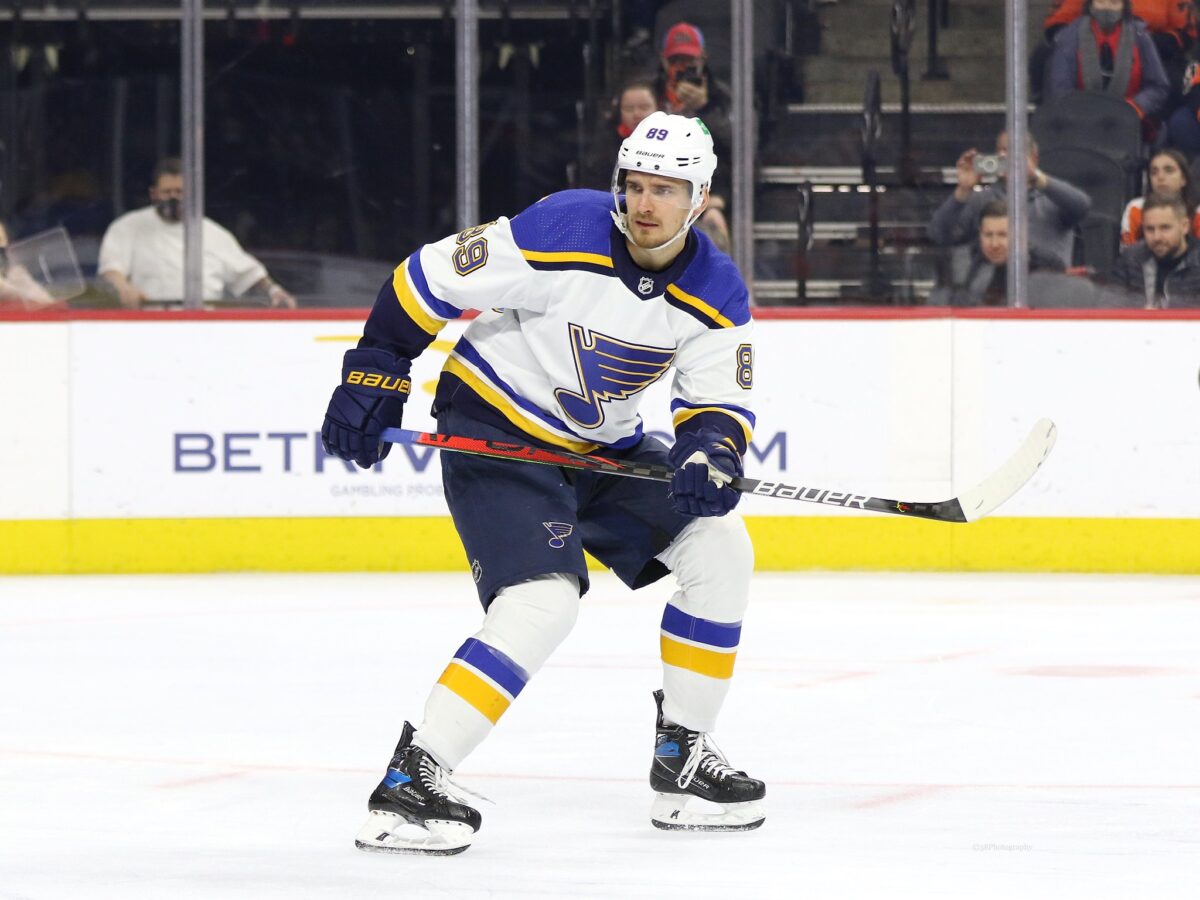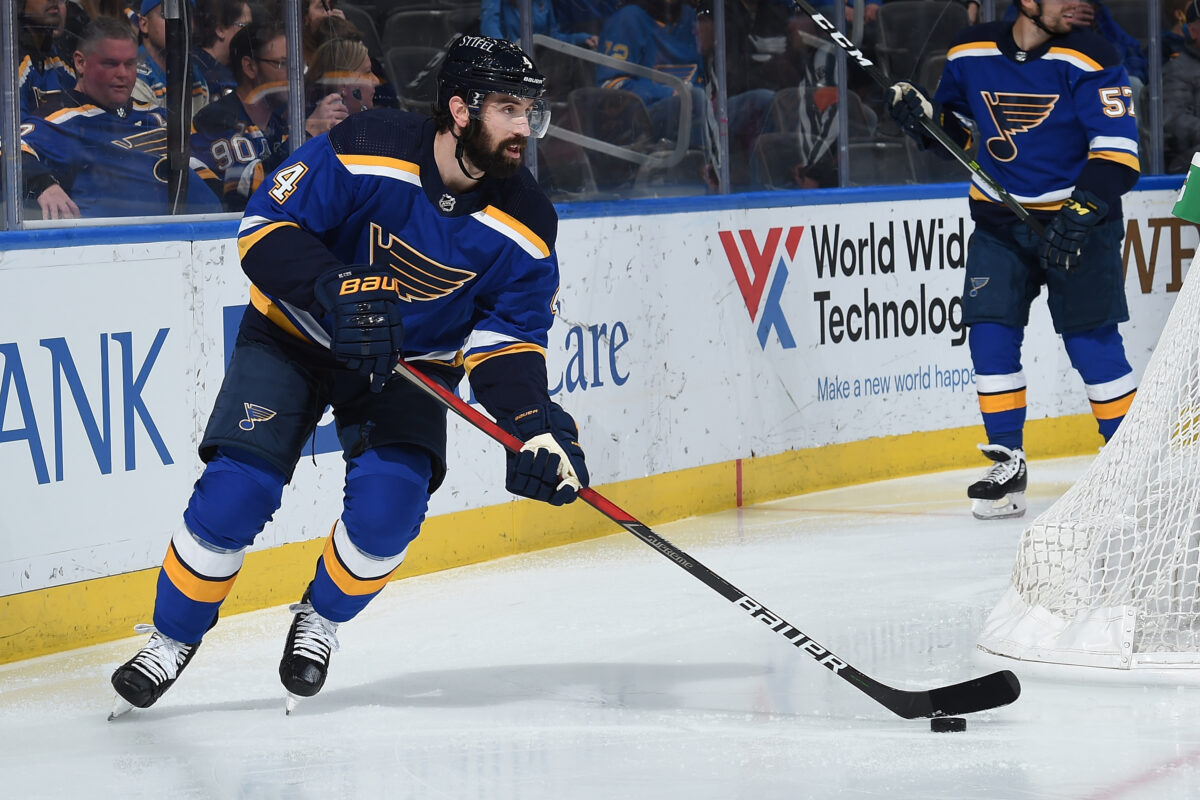The St. Louis Blues 2021-22 season represented a major transition for the franchise. No longer a stout defensive team built from the blueline out, they finished second in the NHL in goals scored, with nine forwards recording 20-plus goals. Though the season came to an end in a six-game defeat by the Colorado Avalanche in the second round, there are plenty of highs and lows to reflect on. In this series, we’ll evaluate each player who played 10 or more games with the team (as well as the head coach and general manager), grading their individual performance and looking at their future with the team.
The success of an NHL team begins and ends with the work of its general manager. They get little of the glory when the team succeeds, but all of the blame when it fails. General managers are shuffled about like deck chairs on the titanic, with exactly half of the league’s current executives having been hired in or after April 2019. So is already quite a statement that in Doug Armstrong — who assumed his current office in July 2010 — the St. Louis Blues have the second-longest-tenured general manager in the league.
Related: Blues’ 12 Days of Hockeymas: 11 Years of Armstrong
But each new season is judged independently, and a report card series wouldn’t be complete if we skipped the GM in the process. So in this article, we’ll take a look at Armstrong’s season. It’s always hard to judge a GM season-to-season since their decisions tend to have long-term consequences. But we’ll do our best to focus on the moves Armstrong made immediately prior to and during this season.
What Went Right
Pavel Buchnevich Trade
The Blues made an early move last offseason by acquiring Pavel Buchnevich from the New York Rangers. Last season, Buchnevich was on the receiving end of a controversial encounter with Tom Wilson. The Rangers decided they couldn’t re-sign him, and Armstrong swooped in and got him for a song, relinquishing Sammy Blais and a second-round pick.

The Blues signed Buchnevich to a four-year, $23.2 million contract, making him a young addition to their core. And he immediately rewarded them. He finished with over a point per game, notching 76 in 73 contests. That put him third on the team, and he also finished second on the team in goals, with 30. Other than slightly disappearing in the playoffs, at least in the goal-scoring department, he had a perfect first season in St. Louis, and his acquisition immediately goes near the top of Armstrong’s all-time trade list.
Brandon Saad Signing
Though his first season wasn’t quite as dominant as Buchnevich, the Blues can’t have any complaints about Brandon Saad after signing him as a free agent last summer. He got 24 goals and 25 points in 78 games and was a major contributor on what became the league’s second-best power play. The Blues have Saad for four more years at $4.5 million per season, and, sure, it could sour in the later stages. But so far, so good, and another success for Armstrong with Saad.
Keeping Vladimir Tarasenko
It’s hard to give Armstrong too much credit for this one because he did try to let the Seattle Kraken take Vladimir Tarasenko for free. He certainly looked for a suitor after his star winger requested a trade last summer, and Armstrong couldn’t find one. But Tarasenko’s return wasn’t the disaster it could have been — quite the opposite! He had a career year in St. Louis, with a career-high 82 points in 74 games, with 34 goals, leading the team in both categories. Now, Armstrong can reevaluate his situation: does he want to extend Tarasenko, who is a free agent after this season, or trade the asset who now has tremendous value? Either way, Armstrong turned a negative into a positive by doing nothing — often the hardest thing for a general manager — but we’ll admit that might not have been fully his doing.
Nick Leddy Trade
The Blues were linked to just about every defender on the trade market during the season. Ben Chiarot was too expensive. Mark Giordano clearly only wanted to return home to Toronto. The Boston Bruins won the race for Hampus Lindholm. In the end, Armstrong seemed to settle for the best of what was left, acquiring Nick Leddy from the Detroit Red Wings in the final hours of deadline day.

Many were critical of the trade, which felt like an underwhelming solution to what was clearly a significant need on the left side of the Blues’ defense. But Leddy blended well with the Blues and immediately found success in his new home, looking like he shed several years off his legs. It’s unclear whether the Blues will seek to re-sign Leddy — they may well look for a longer-term solution. But for a deadline rental, it doesn’t get much better than the low price and unquestioned success they found in trading for Leddy.
What Went Wrong: The Parayko Extension
There’s really only one major concern about what Armstrong did this season. In September, the Blues signed Colton Parayko to an eight-year, $52 million contract extension. We talked at the time about the big gamble the Blues made: seeing right-handed defensemen all around the league signing major extensions, Armstrong bet that after a rough season riddled with injury, he could lock in the center of his defense on a long-term deal at bottom dollar. So far, the gamble hasn’t paid off.

It’s not fair to say that Parayko was bad this season — he’s adequate most of the time, and great some of the time. But his rotten postseason performance, especially late in the series the Blues lost to the Colorado Avalanche, left a bad taste in many fans’ mouths. And even without that, he never rose to the level of a cornerstone defenseman like the Blues have clearly hoped he would ever since allowing Alex Pietrangelo to go to the Vegas Golden Knights. They’re looking for him to regain the shutdown form he had while playing alongside Jay Bouwmeester in the team’s 2019 Stanley Cup run. But it looks less and less likely that he will ever be that player consistently.
It’s not that Parayko is bad or even dramatically overpaid. But the Blues already had two long contract commitments on defense, and now they have three. Perhaps Armstrong will find Parayko a consistent defensive partner and he’ll become a more steady blueliner. If he does, we’ll write stories about how brilliant it was for Armstrong to extend him when they did. But as it stands, the Blues would probably rather have the flexibility of determining Parayko’s fate now, whether by re-signing him for a lower AAV or term or allowing him to test the free-agent market.
Key Facts
- Second longest-tenured general manager in the league (behind David Poille), serving since July 2010
- Assembled a roster with nine forwards that scored 20-plus goals (just the second in Blues history)
- Built a playoff team for the fourth season in a row and 10 of the 12 seasons of his tenure
FInal Grade: A-
You don’t serve for 12-plus seasons as a general manager in the NHL — especially for one team consecutively — by making a lot of major mistakes. The Blues reached the playoffs and gave the Avalanche by far the toughest challenge they’ve faced yet at the time of this writing. More importantly, Armstrong transformed the franchise from a defense-first team to a squad that had nine different players score 20-plus goals. They are getting younger, faster, and higher-skilled thanks to the work he is doing. Blues fans should be thankful to have a GM as good as Armstrong in a league where finding the right executive can be such a challenge.
What’s Next for Armstrong?
Personally, Armstrong has no questions about his future. He is signed in St. Louis through the 2025-26 season, and he could probably continue to serve beyond that if he so pleases. But in his role as general manager, he is set for a busy summer.
Related: Blues’ Top 3 Questions to Answer This Offseason
David Perron is a free agent, as is Ville Husso, who stepped up in a big way for the team this season. Tarasenko will be a UFA after next season, so Armstrong must decide whether he wants to extend him or trade him now that his value is sky-high. He cannot reasonably walk Tarasenko to free agency and let him leave. Additionally, team captain Ryan O’Reilly will be a UFA after next season, and young centerpieces Jordan Kyrou and Robert Thomas will both be due hefty contract extensions. Armstrong has a lot of decisions to make as he continues to build the Blues for 2022-23 and beyond. But if history is any barometer, he’ll make the right moves to put St. Louis in a position to succeed.